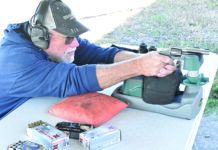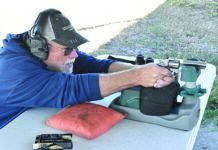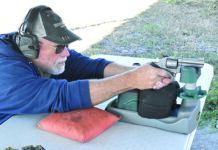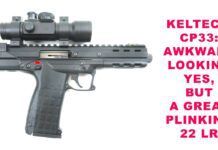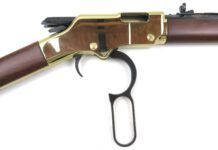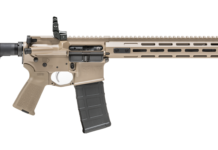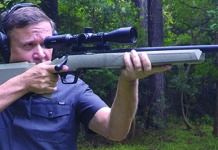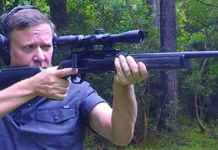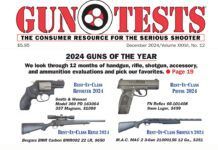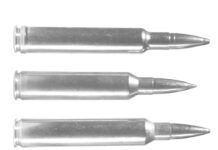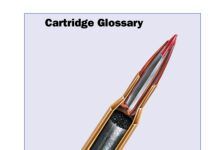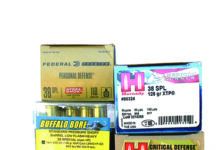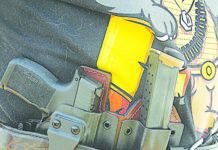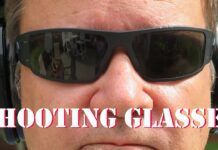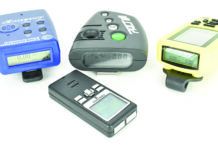The 10mm Auto is a powerful cartridge. When the 10mm is loaded to its full potential, it produces magnum-caliber revolver energy, and depending on the bullet and velocity, it can best the typical 357 Magnum load and come in just below the typical 41 Magnum load. That’s hot. It’s a powerful and effective round, especially in a semi-automatic.
The hapless Bren Ten was the first semi-automatic pistol to be chambered in the round back in 1983 by Dornaus & Dixon Enterprises. The second gun to be chambered in the round was the Colt Delta Elite in 1987. The 1911 platform is strong, and after a few fits and starts early on with cracked frames, Colt was able to adapt the 1911 platform to the cartridge. Part of the problem with the 10mm Auto is the pressure, which is about 37,5000 psi. The 357 Magnum has a pressure of about 35,000 psi, and the 41 Magnum has 36,000 psi. The pressure literally wants to destroy guns. Since the 1980s, other manufacturers have introduced 10mm striker-fire pistols, handguns based on the CZ-75 design, DA/SA models from Smith & Wesson, and other 1911 models. We wanted to take a look at the 1911 platform in this hot round, so we procured three 1911s chambered in 10mm Auto — a Springfield Armory (SA) Ronin, Kimber Rapide Black Ice, and Rock Island Armory Pro Match Ultra 6″.
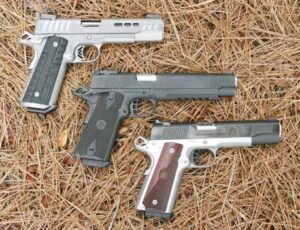
Factory 1911s can have quite a bit of variation from pistol to pistol in trigger feel and quality, as well as slide-to-frame fit, and the blending of the thumb safety and grip safety. Typically, the lower the cost, the less workmanship that goes into the 1911. Remember, a 1911 needs to be hand built and fitted. It is not like today’s striker-fire guns that are easily assembled. The hand-fitting is also why some 1911s are finicky about ammo and running smoothly.
All three of these 1911s are very similar. It’s the details that separate them. The SA and Kimber feature 5-inch barrels, and the Rock Island Armory (RIA) does them one better with a 6-inch tube. The RIA and SA have thinner grips and no magazine well, while the Kimber grip is thick, and it has a magwell for smoother reloads. Another common feature are highly visible and usable sights. The RIA goes a step further with a fully adjustable rear sight, while the Kimber and SA have driftable rear sights.
How We Tested
We did experience a failure to eject and a failure to slide lock back on the Kimber, but that was with the first magazine. From then on, no issues. The RIA also experienced an initial failure to lock the slide back. We attribute these issues to needed break in. After those minor hiccups, the pistols ran flawlessly. The Springfield ran flawlessly from the get go.
We averaged 1- to 1.5-inch five-shot groups at 15 yards across all three pistols. There is a reason why many shooters like the 1911 platform’s single-action trigger. With all of these pistols, we were able to shoot our best groups under 1 inch using a rest. In many instances, holes overlapped each other. With more range time, we are certain we could easily tighten the groups with any of these guns.
Ammo used during testing consisted of Federal Premium HST 200-grain JHP defense rounds and two training rounds; Magtech and Armscor loads with 180-grain FMJ bullets. All three of these loads cranked out of the muzzle doing a respectable 1100 fps, on average. This is powerful ammo, and when we tabulated the data, we found it accurate as well. Using a rest, we fired at Thompson Trouble Shooter targets set at 15 yards. All three pistols showed good to excellent accuracy. The RIA was exceptionally accurate, with many tight groups showing touching bullet holes.
Recoil was stout, so don’t think a 10mm Auto is for the faint of heart or recoil shy. The Kimber and RIA have front grip strap texture that helps with grip control. This additional texture helps to prevent grip slippage from recoil when the gun is fired. These guns did a good job of recoil management, and the RIA offered faster follow-up shots due to the extra weight.
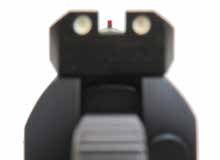
We tested the guns’ fast-shooting qualities at 15 yards using a plain 8.5-by-11-inch white piece of paper with a 2-inch black square printed in the middle. We fired fast, at the edge of control, and we were able to keep rounds on target. We needed to lean into the pistol because recoil is fast and snappy, and it can get away from you if you are not paying attention. You don’t want to shoot a 10mm fast standing on your heels. We stood on the balls of our feet with knees slightly bent. Most fast-shooting groups we could cover with our hand. We also noticed the web of our hand was getting a workout. No abrasion from any of the guns, but we did notice some grips were more comfortable, namely the SA and the RIA. The Kimber grips have a high cool factor and were comfortable, but not as comfortable as the grips on the other two guns. Some of our testers grip a 1911 and ride the controls, meaning a right-handed shooter will rest the shooting-hand thumb on the thumb safety and the thumb of the support hand on the slide stop. Those with average to small hands noticed the larger grip circumference of the Kimber compared to the SA and RIA, and in some cases needed to change their grip for better trigger control. We also swapped magazines between guns to see if we could trip up any of them. We had no feeding issues.
That’s the high-level view of these 10mm pistols, now let’s get into the weeds.
Gun Tests Grade: A
$799
We have tested SA’s Ronin 1911 pistol chambered in 45 Auto a few issues back and graded it an A- due to a single, odd malfunction that was most likely due to a magazine. We had no such issues with the 10mm variant, and that is why we give this pistol a solid A rating.
| Action | Semi-auto, locked breech single action |
| Overall Length | 8.6 in. |
| Overall Height | 5.5 in. |
| Maximum Width | 1.2 in. |
| Weight Unloaded | 40.0 oz. |
| Weight Loaded | 46.6 oz. |
| Barrel | 5.0 in. |
| Capacity | 8+1 (single stack) |
| Slide | Blued steel |
| Slide Retraction Effort | 20.0 lbs. |
| Frame | Matte stainless steel |
| Frame Front Strap Height | 2.6 in. |
| Frame Back Strap Height | 3.2 in. |
| Grips | Wood laminate, partially checkered |
| Grip Thickness (max) | 1.1 in. |
| Grip Circumference (max) | 5.2 in. |
| Front Sight | Fixed fiber optic |
| Rear Sight | Tactical rack rear |
| Trigger Pull Weight | 5.8 lbs. |
| Trigger Span Single Action | 2.8 in. |
| Magazines | 1; stainless steel w/bumper pad |
| Safeties | Thumb, beavertail grip |
| Warranty | Lifetime |
| Made In | U.S.A. |
| Website | Springfield-Armory.com |
There is nothing particularly fancy about the Ronin 10mm Auto. It has a classic two-tone finish with a matte-stainless receiver/frame and blued slide. There is no accessory rail, and we feel there is no need for one if this gun is to be carried concealed. The finish was well executed and what we expect from Springfield.
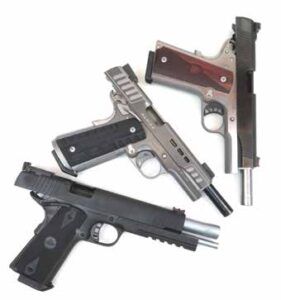
The front sight is a red-fiber-optic pipe that contrasts nicely with the two white dots in the Tactical Rack rear sight. You can rack the slide by using the rear sight as leverage against the mouth of your holster or some other object. We really like the huge notch in the rear sight because it makes it easier to acquire the red dot front. The rear face of the rear sight was serrated to reduce glare. These are excellent sights for a defense gun or action-pistol competition. The slide sports front and rear angled serrations that allow for easy press checks. They also provide a good grip when racking the slide. A G.I.-style bushing makes for easy disassembly, and there’s no need for extra tools or a bent paperclip to capture the recoil spring.
The matte-stainless frame/receiver has a smooth front grip strap. The mainspring housing is finely checkered. We would have liked serrations or a less aggressive texture on the front grip strap for added grip adhesion. The grips are Ahrends-style with the lower front of the grip checkered and the top rear smooth. The strategy here is the area of the grip in contact with the web of your hand does not get eaten raw from the checkering during recoil. Did we mention the 10mm has recoil? These are excellent grips. These grips are also thinner than the typical G10 grips on newer 1911s.
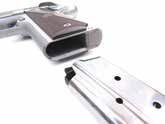
The trigger is SA’s new Gen 2 skeletonized trigger, which operates the same as Gen 1 triggers. Both have a short reset, but the Gen 2 trigger has four holes, while Gen 1 triggers have three holes. On our sample, the trigger broke at 5.8 pounds, which is okay on a defense pistol. We would have like it between 4 and 5 pounds. The trigger face was serrated.
This pistol also uses a 24-pound recoil spring, which is heavier than a 9mm and 45 Auto variant. Our sample came in a soft zippered nylon case with one eight-round stainless-steel magazine. To rack the slide took 20 pounds of effort. The match-grade barrel is stainless and had no wiggle in the bushing. Slide-to-frame tolerances were tight.
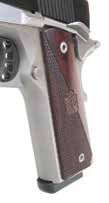
The beavertail grip safety shields the delta-style hammer spur, preventing hammer bite. There is a single thumb safety with an oversized serrated lever, which worked perfectly. One way SA keeps the cost down on the Ronin is not installing an ambidextrous safety nor providing more than one magazine. Only one stainless magazine with a bumper pad comes with the Ronin. We would have liked two magazines. An extra mag ($28; Springfield-Armory.com) is not that expensive. The grip safety has a fairly large bump at its base to ensure the safety is fully depressed with a proper shooting grip.
The thumb safety is also nicely blended and smooth, so as the pistol recoils in your hand, there are no sharp edges to abrade your hand. The magazine button is serrated, and we would have liked it checkered and a smidge taller for a bit more friction when operating it fast.
Where the Ronin showed its stuff was at the range. The sights and crisp, consistent trigger helped us shoot best groups that measured 0.8 and 0.9 inches with the Federal and Armscor ammo, respectively. On average, groups measured between 1.1 and 1.6 inches. In speed shooting, we found the thinner grips helped those shooters with average to smaller hands control the pistol. The red-fiber-optic front sight was also easy to track on the black-and-white target.
Our Team Said: Recoil was noticeable with the Ronin, but it was easily managed. This is a no-nonsense self-defense 1911 in a serious chambering. The grips, sights, trigger, and cost easily make the Ronin a Best Buy. If you want a 1911 in 10mm for self defense, the Ronin is an excellent choice.
10mm Auto Range Data
| Magtech 180-grain FMJ | Rock Island Armory Pro Match Ultra 6" | Kimber Rapide Black Ice | Springfield-Armory 1911 Ronin |
| Average Velocity | 1199 fps | 1165 fps | 1180 fps |
| Muzzle Energy | 575 ft.-lbs. | 543 ft.-lbs. | 567 ft.-lbs. |
| Smallest Group | 1.1 in. | 0.7 in. | 1.5 in. |
| Average Group | 1.2 in. | 0.9 in. | 1.6 in. |
| Federal Premium HST 200-grain JHP | Rock Island Armory Pro Match Ultra 6" | Kimber Rapide Black Ice | Springfield-Armory 1911 Ronin |
| Average Velocity | 1132 fps | 1130 fps | 1144 fps |
| Muzzle Energy | 569 ft.-lbs. | 567 ft.-lbs. | 581 ft.-lbs. |
| Smallest Group | 0.6 in. | 0.8 in. | 0.8 in. |
| Average Group | 0.8 in. | 1.3 in. | 1.1 in. |
| Armscor 180-grain FMJ | Rock Island Armory Pro Match Ultra 6" | Kimber Rapide Black Ice | Springfield-Armory 1911 Ronin |
| Average Velocity | 1117 fps | 1088 fps | 1113 fps |
| Muzzle Energy | 499 ft.-lbs. | 473 ft.-lbs. | 496 ft.-lbs. |
| Smallest Group | 0.7 in. | 1.2 in. | 0.9 in. |
| Average Group | 0.8 in. | 1.3 in. | 1.1 in. |
| Gun Name | Issue | Grade | Comments |
|---|---|---|---|
| Smith & Wesson M&P40 M2.0 11522 40 S&W, $581 | Oct. 2021 | A | Best Buy. The 18-degree grip angle made the M&P M2.0 feel natural. The trigger was very consistent. |
| Glock G23 Gen5 PA235S203 40 S&W, $700 | Oct. 2021 | A | Recoil management was excellent. We like the flared magwell, front slide serrations, and improved trigger pull. |
| Heckler & Koch P30S-V3 81000127 40 S&W, $859 | Oct. 2021 | A- | The P30 is the benchmark for a DA/SA-style pistol with an excellent grip and sights and good accuracy. |
| SIG Sauer P239 23940BSS 40 S&W, $600 | Oct. 2021 | A- | Recoil was controllable and accuracy was good. Design felt dated, but we’d consider buying a used P239. |
| Springfield Armory XD-M 5.25 10mm Auto, $681 | Sept. 2020 | A- | Best Buy. To take backpacking in the boonies, the XD-M and its 16-round payload might well be our choice. |
| Colt Delta Elite 02020RG 10mm Auto, $1134 | Sept. 2020 | A- | When we were firing the Buffalo Bore stompers, we were just fine with the Colt’s smooth front strap. |
| SIG Sauer Tacops 10mm Auto 1911R-10-TACOPS, $1050 | Sept. 2020 | B/A- | Had extraction issues initially. SIG fixed the problem fast, so we upgraded its marks to include customer service. |
| Lone Wolf TWL-S Frame/Gray Man Slide 10mm, $884 | Aug. 2020 | A | The Grey Man G20 is a handful. The small grip made this pistol easier to conceal. Trigger was excellent. |
| Springfield XD-S 3.3-Inch XDS93340BE 40 S&W, $378 | Sept. 2019 | A | Best Buy. Completely reliable, accurate enough for personal defense. Useful trigger action and good sights. |
| Kahr CW40 CW4043 40 S&W, $301 | Sept. 2019 | B | A well-made and reliable handgun, despite a number of corners being cut to offer the pistol at a low price. |
| SIG Sauer P224 SAS 224-40-SAS2B 40 S&W, $800 | Sept. 2019 | B | A compact pistol with a short barrel and grip that takes some getting used to, yet excellent accuracy. |
| Taurus G2C 1-G2C4031-10O 40 S&W, $250 | Sept. 2019 | B | An upgrade over the original, with superior grip treatment and a new matte-finished slide. |
| Smith & Wesson Shield 180020 40 S&W, $337 | Sept. 2019 | D/D | We tested two Shields, one with a safety and one without. The 180020 with safety short-cycled. The 10034 non-safety Shield had a failing trigger return spring that caused a stoppage. |
| Glock G40 Gen4 MOS 10mm Auto, $706 | Mar. 2019 | A | Longer sight radius and ability to mount a red-dot optic made the G40 a close contender for top dog in the test. |
| Springfield 1911 RO Elite Operator 10mm Auto, $1145 | Mar. 2019 | A | Well adapted for the 10mm cartridge. We like the sights and love the trigger. Grip texture is a bit raspy. |
| Springfield Armory XDM 10mm Auto, $779 | Mar. 2019 | A | Best Buy. Great ergonomics, nice grip angle, modular grip strap, crisp trigger, nice sights. Reasonable cost. |
| Glock G35 Gen3 PI3530103 40 S&W, $560 | Jul. 2017 | A | The G35 in 40 S&W is a good competition pistol. A 9mm barrel makes it more affordable to shoot. |
| Smith & Wesson Model 1076 10mm Auto, $800-$825 | Nov. 2017 | A- | As a compact 10mm, a used 1076 is an excellent choice. Trigger could have been better. |
| Colt Delta Elite O2020XE 10mm Auto, $1099 | Nov. 2017 | A | The latest Delta Elite is an excellent full-size 1911 chambered in 10mm. We liked the trigger, sights, grip. |
| EAA Tanfoglio Witness 10mm Auto, $665 | May. 2017 | A | Best Buy. Relatively compact and accurate, plus it is affordable. |


